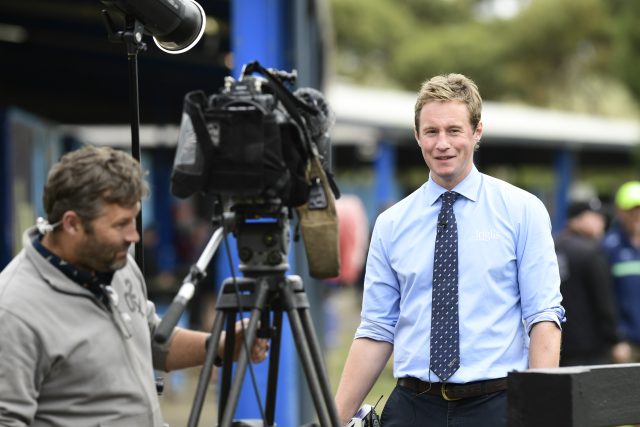
With COVID’s cloud lurking over a second Inglis Australian Easter Yearling Sale we talked with the company’s General Manager Bloodstock Sales and Marketing, Sebastian Hutch, to get his perspective on the past 12 months, and what we can look forward to at Riverside in April.
Despite predictions of Armageddon this time last year, the Australasian bloodstock market has remained incredibly resilient. Could you tell us what some of the changes in practices were that you feel bolstered confidence in the market?
There’s no disguising the fact it has been challenging. The uncertainty, both in terms of basic scheduling and the financial uncertainty that leads to, has been a great concern for a lot of people and in some respects continues to be so. That said, there are a lot of positives to come out of the pandemic period and there are a lot of initiatives adopted by buyers, vendors and auction houses alike that are going to become permanent features irrespective of operational procedures returning to what we would consider normal. The nature of pre-sale videos has evolved dramatically since the onset of the pandemic; footage of horse’s that vendors wouldn’t previously have contemplated showing is now the industry standard for pre-sale promotion of yearlings. The pandemic has also highlighted to buyers the need to take time out to conduct pre-sale inspections on farm, getting multiple looks on horses and all round managing their workload more efficiently.
What have been some of the take aways for the auction house?
From Inglis’ point of view we’ve learnt a lot in relation to the information that is important to buyers and what shapes their decisions. The opportunity to have a yearling weighed and its height measured was taken up by a number of people and we can only assume it was a contributing factor in the Classic Sale breaking previous records.
The implementation of the Sale Day Live broadcast with hosts, interviews etc undoubtedly contributed to positive outcomes for our sales including last year’s Ready 2 Race, Easter and Chairman’s Sales. The management and production of Sale Day Live is conducted exclusively in house and it is put together in a manner we feel offers the best way of generating extra value for our vendors and buyers. It was a necessity as a consequence of the circumstances surrounding last year’s virtual Easter Sale, but since then it has evolved and is certainly a positive to come out of the Coronavirus era. The viewing figures have been extraordinary, and we feel there is room to make it better and better over time. What it has done is give the viewer a feeling for what is going on at the sale. That a number of independent organisations have been in contact looking to pick up the feed for the Premier and Easter Sales is a great compliment in itself.
Online bidding now makes up a significant share of the “live sale” market, has it had an impact in other areas of the business?
Online bidding has been a feature of Inglis’ sales for many years now and pre-dates the pandemic considerably, so it’s not a new concept for us. What has been interesting is watching the evolution of our Digital Sales platform during that time, the way in which it has drawn new participants into our market and the progression of those people from being Digital customers to customers in our live market auction and vice versa. I would struggle to name a major Australian operation that wasn’t engaged in our digital platform in some way.
What the digital platform has done is introduced business from a slightly different angle, say, for people that might previously only have been interested in tried horses it has now opened opportunities for them to consider other areas like the Ready 2 Race Sale or the Classic Sale. And like all sections of the market if the buyer is prepared to put the work in there is tremendous value to be had. Just this past Thursday of the 55 races run across Australia ten were won by Inglis Digital graduates, that is getting up towards 20% and not insignificant.
Do you think the online option has reshaped the market?
I think the answer to that is it has facilitated buyers participating in a sale. Obviously if the online bidder is someone who wouldn’t have had the opportunity to bid live at auction then that has clearly been a positive. We have seen that, particularly at the height of the restrictions through April and May, buyers at the top end of the market were prepared to trust the platform. The sale that springs to mind is the Chairman’s where there were sales of million-dollar mares where the bidding was conducted exclusively online, a reflection of how the industry has evolved. We now have clients who will come to the pre-sale and complete their inspections but will do their bidding online from their office. These are buyers purchasing significant numbers and I think nothing speaks for the convenience of online bidding greater than that. We also have clients who will sit in the auditorium and bid online to keep the opposition on their toes. It certainly brings another layer of intrigue to a sale.
With a year’s worth of COVID experience under the belt what can we expect at Easter this year?
That is a difficult question to answer given the nature of the pandemic in Australia. The situation remains fluid so setting hard and fast plans for Easter is impossible. As we speak there are still restrictions on the number of people that can gather and where they can gather which makes things like hospitality arrangements challenging for us to plan.
But in many respects we want to run a sale that is very familiar in terms of the entertainment and the spectacle. It has traditionally been the most exciting sale of the year, every year, and we don’t see that changing in any way, shape or form. A number of the changes won’t be physically visible by walking around the sale, but the nature of the service we provide to vendors and buyers has been enhanced significantly over the past two years. That has been with the intention of leading to a better outcome for everybody which we feel has been demonstrated to good effect at the recent sales we have run, and there is an absolute determination on behalf of all at Inglis to continue that upward trajectory.
And in terms of horseflesh, has this year’s catalogue met Inglis’ Easter standard?
We are very pleased with how the catalogue has come together – in many respects Easter yearlings pick themselves. Certainly on paper the catalogue looks fantastic and having seen a number of the yearlings myself, it isn’t hard to get excited about the sale.
Over the years the results from this sale have been exemplary and there is no auction in the Southern Hemisphere where you are more likely to buy a good horse, so in that respect you can argue that it is a great value sale. It is where you can buy the best bred and best conformed horses in the country at prices that, at the end of their careers, be they colts or fillies, won’t look expensive. Looking back how does anybody feel about the $700,000 The Autumn Sun cost now that he is an outrageously popular young stallion, or the less than $200,000 Exceedance cost, a subsequent Gr.1 winner now extremely popular first season sire. Similarly how little Trapeze Artist cost as a yearling before he won four Gr.1 races and is an overwhelmingly popular young stallion, just a few of the countless examples of great stories. And looking at the fillies, James Bester and partners bought Pinot for $200,000 who won a VRC Oaks and was then sold to Japan for good money or another Oaks winner in Aristia who cost just $80,000. We think there will be plenty more stories like those in the 2021 catalogue.
Looking back on this sale in years to come there are bound to be plenty of examples where people will say “gee that was well bought” or “that was good value”. I’d encourage people not to be deterred from participating at Easter because of the headline making lots that bring big prices because there will be horses that time will demonstrate were bought for very small money. Work with the auction house or work with an agent that can help you identify the horses that are in your price bracket, and there will be people come home with a bargain, that’s an absolute certainty.



